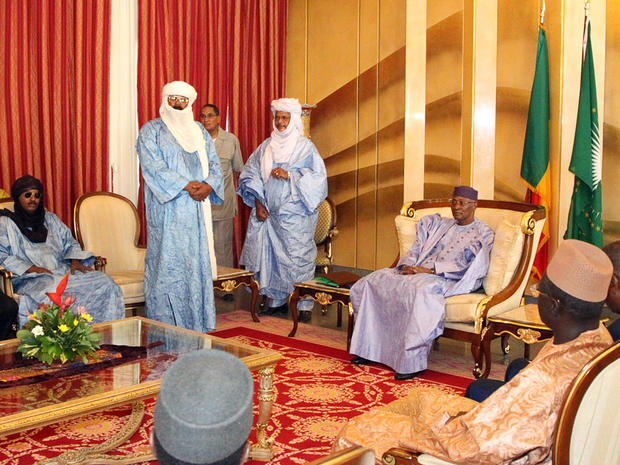Mali gov't ousted by military coup
BAMAKO, Mali - Soldiers stormed the presidential palace of one of the only established democracies in this corner of Africa and announced Thursday that they had seized control of the country, ousting Mali's president just one month before he was due to step down at the end of his legal term.
Gunfire could be heard ringing throughout the capital, and the mutinous soldiers imposed a nationwide curfew. A flight headed to Bamako was forced to make a U-turn in the air after the airport closed. The soldiers said they are overthrowing the government because of its weak response and mishandling of an ethnic Tuareg insurgency in the country's north.
On national television, a group of around 20 soldiers in military fatigues were shown crowding around a desk, facing the camera. They announced that the country is under the control of the military's National Committee for the Reestablishment of Democracy and the Restoration of the State, or CNRDR. They said they were suspending Mali's constitution and dissolving its institutions.
Official: Coup d'etat underway in Mali
The soldiers complained that the civilian government had not done enough to combat a rebellion by ethnic Tuareg separatists who want to carve out a homeland in the country's northern desert.
"The CNRDR representing all the elements of the armed forces, defensive forces and security forces has decided to assume its responsibilities and end the incompetent and disavowed regime of (President) Amadou Toumani Toure," they said, reading from a statement. "The objective of the CNRDR does not in any way aim to confiscate power, and we solemnly swear to return power to a democratically elected president as soon as national unity and territorial integrity are established."
The coup is a major setback for one of the region's few established democracies. The ousted president came to power himself in a 1991 coup, but was hailed for handing power to civilians. A decade later, he ran and won the 2002 democratic election. The 63-year-old Toure was due to step down next month after two, five-year terms.
His whereabouts were unknown on Thursday. Contacted by telephone, a soldier at the palace said that the president's bodyguards had failed to fight the renegade soldiers, who burst in. They searched the grounds looking for him, but could not find Toure.
The events that culminated in the coup began Wednesday morning at a military camp in the capital, where Defense Minister Gen. Sadio Gassama came for an official visit. In his speech to the troops, the minister failed to address the grievances of the rank-and-file soldiers. The rebellion has claimed the lives of numerous soldiers, and those sent to fight say they are not given sufficient supplies, including arms or food.
Recruits started firing into the air Wednesday morning. By afternoon, troops had surrounded the state television station in central Bamako, located in southwest Mali, yanking both the television and radio signals off the air for the rest of the day. By Wednesday evening, troops had started rioting at a military garrison located in the northern town of Gao, some 2,000 miles (3,200 kilometers) away.
A freelance journalist from Sweden who was driving to her hotel near the TV station around 4 p.m. Wednesday said that trucks full of soldiers had surrounded the state broadcaster, where they set up machine guns facing the building.
"They came and started setting up checkpoints. There were military in the streets, stopping people," said Katarina Hoije. "When we reached our hotel which is just in front of the TV station, there were lots of military outside, and more cars kept arriving — pickup trucks with soldiers on them."
In Washington, U.S. State Department spokeswoman Victoria Nuland said: "The situation is currently unclear and unfolding quickly ... There are reports of military forces surrounding the presidential palace and movement of vehicles between the palace and the military barracks."
The Tuareg uprising that began in mid-January is being fueled by arms leftover from the civil war in neighboring Libya. Tens of thousands of people have fled the north, and refugees have spilled over into four of the countries neighboring Mali due to the uprising.
The government has not disclosed how many government soldiers have been killed. The toll is believed to be significant and in February, military widows led a protest, publicly grilling Toure on television over his handling of the rebellion.
On state television on Thursday, the putschists announced a curfew starting at dawn until further notice and the closure of the airport. They called for calm and said violence and pillage would not be tolerated. Their spokesman, who was identified on screen as Lt. Amadou Konare, said the coup was caused by the government's incompetence in dealing with the insurgency.
"Given the inability of the government to give adequate means to the armed forces for defending our territorial integrity, and considering the climate of uncertainty that has been created and that has been fueled by those in power ahead of the 2012 election, and considering the inefficient manner in which they have fought against terrorism and to restore the dignity of the Malian people," he said, "the CNRDR has decided to take into its own hands the security of all of Mali."
The regional body representing states in western Africa issued a statement condemning the putsch, especially since it comes just after a delegation from the African Union traveled to Mali to try to negotiate a solution to the rebellion.
"The disturbances sparked by elements within the armed forces are all the more reprehensible, coming amidst the on-going regional and international efforts to seek a peaceful solution to the rebellion in the north of the country," said the statement from the Economic Community of West African States, or ECOWAS. "ECOWAS strongly condemns the misguided actions of the mutineers and warns that it will not condone any recourse to violence as a means of seeking redress."
